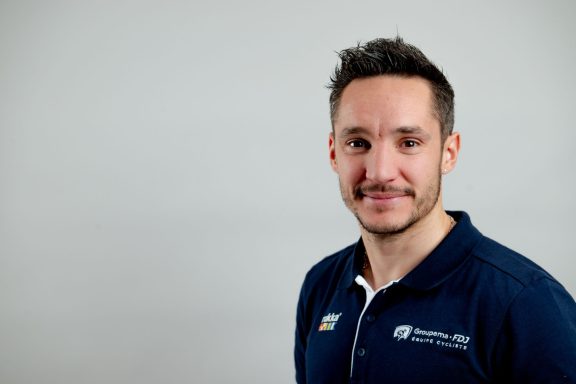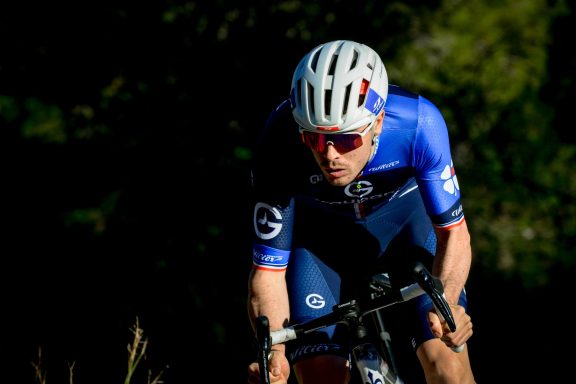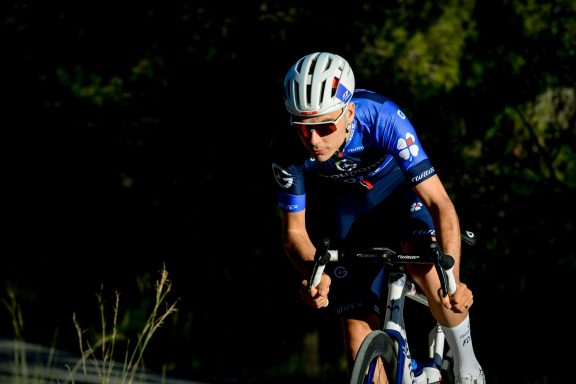After having worn the Groupama-FDJ’s colours as riders, several people are now working within the organization in various positions. Changing careers through the team may seem logical, but it is never insignificant. We met several of these former riders. Today, we sat down with William Bonnet. A loyal road captain of the Groupama-FDJ cycling team from 2011 to 2021, the 40-year-old Frenchman is now responsible for race logistics.
William, what approach did you have regarding your career change?
It’s not something I thought about when I was a rider. I felt that the job of being a rider already required enough concentration. Focusing on my primary job was essential for me, and I always told myself that I would think about it when the time came. So, I didn’t think about it during my career. In the very end, you inevitably start to think a bit more about it, but I mostly wanted to end my career in the best way. It was not my primary concern. We then had talks with the team during my last year. Knowing that they would potentially offer me a position in the team gave me, of course, a certain peace of mind, and it allowed me to have an easier approach to the future.
“I have always been interested in the staff’s life”
Did you want to stay in the world of cycling?
Quite frankly, I told myself that there were plenty of things to do in life, and not necessarily in sport. It was not an obligation for me to stay in cycling. That said, sport still is what guided and built my life until I was forty. So that’s something important to me. I also had personal needs. I did not want to travel all the time, I wanted to be more at home. When you are a rider, they usually ask you if becoming a sports director could interest you. Right now, I didn’t really want to. I rather wanted to settle down a bit and enjoy my family.
How did the transition take place, concretely?
Just as I retired as a rider, some people in the organization are also retiring, naturally. There is replacement, regularly, and we knew that Martial Gayant would soon be able to leave and that a position would therefore become available. The team’s management discussed it internally to find out who could take over the position, and they thought of me. We talked about it between us, and it was an opportunity that interested me because of the position itself and what it is about. Not being far from the team’s headquarters, it was also perfect for what I was looking for at that point. Following my retirement, I took some time to rest, but I was immediately included in meetings to see how the life of the team was going from a logistical point of view, behind the scenes. As riders, it’s something we don’t really know and that we don’t imagine. The first year was interesting. I came a few times to also understand what my future role was going to be.
Why did you accept a role quite far from the sporting side of things?
The first reason was that I wanted to be more sedentary, to travel less, because just like many riders, I sacrificed a lot during my career regarding my family. I needed to find myself at home. The other reason is that I always had a good relationship with the staff, the assistants, the mechanics, and I have always been interested in their life. It always interested me to know what they were doing, how their daily life was going. This is also why working with them, on their program, their planning, their needs, is something that appealed to me. We have known each other for all these years, and I could also sometimes hear them complaining or having requests. I now have the opportunity to respond to their needs and requests while aiming for the team to function well. I wondered if I was going to miss the field in the long run, but nothing prevents me from going there if I feel the need.
“You have to adapt”
Can you tell us about your role today?
I am responsible for race logistics. This has to do with the planning of assistants, physiotherapists, and mechanics. I need to organize their schedules, their visits to the service course, their trips, plan everyone’s working hours, know when, how and where they will step in. In short, I have to make sure that everything and everyone is in the right place at the right time, that there are enough staff, vehicles or bikes. I am also responsible for the management of the vehicle fleet. I have to manage all of this to ensure that the team can work in good conditions during training camp or competition.
Martial also said that his role was, among other things, to “sort the shit out”?
We try to foresee a lot of things, but we especially have to deal with the hazards, that’s true. Martial knew what he was talking about, he has a lot of experience. As far as I’m concerned, I am still discovering, and it is not an easy position to run. There are a lot of things to put in place, but we also depend on a lot of factors and independent contractors. We have to solve a lot of problems, cope with a lot of unforeseen events, but with the support of my colleagues, we always manage to overcome these hazards. Sometimes you have to adapt, but that’s part of this job.
Have you learnt a lot from Martial in 2022?
The year I spent with Martial was rewarding in order to see how everything was going concretely. That being said, Martial had his own way of doing things and I’m not here to copy/paste what he did. Above all, his experience was so important that some things were very easy for him to manage. I do not have his experience yet, I will have to learn. This first year is not going to be easy, that’s for sure. There are plenty of habits I need to learn, lots of vehicles and people I have to manage, and they are sometimes spread over three completely opposite areas. This first season is going to be intense, stressful, but I think it will bring me a lot for the future.
“I don’t just have myself to manage”
Do you feel a bit of pressure in this new position?
I know that if the equipment is not in the right place, the team will not be able to work as it should. It obviously brings pressure, and as I was saying, there are external factors that mean that you don’t always have everything under control. Sometimes you need to act urgently. However, when I was a rider, I had only myself to control. From this point of view, it was easier as a rider than now as a logistics manager. I don’t just have myself to manage, and we can’t control everything. That’s the most difficult part.
Does your experience as a rider help you at times?
It’s still very different but having had a long career allows me to have perspective on the possible needs that the team may have. I also rely on various people: Guillaume Bouveret, head of mechanics, Stéphane Pauchard, who works at the service course’s logistics, the sports directors, with whom we often talk, but also the secretaries who are very important in setting up logistics. The role I have today is quite central in the team, and that’s what interested me: being able to see a bit of everything, be in contact with a bit of everyone, so that everything works out. This of course requires a lot of phone calls, talks, and information being centralized.
What would you like to bring to this position?
I’m not going to revolutionize everything overnight, because there is a way of doing things in place, but I hope that we can, little by little, make progress on certain points. I think everyone in the team will agree that what Martial was doing was near perfect. There have never been any problems with bikes or vehicles in the various competitions. He did a great job, and it’s a big challenge to take over his position. It’s no small matter! We will see over the years how we can improve or make the operation smoother. This first year, already, will allow me to lay the foundations and to become more aware of the workload. The goal remains that everything is there on time. That’s my goal every time, and it’s a goal that comes back very often.



No comment